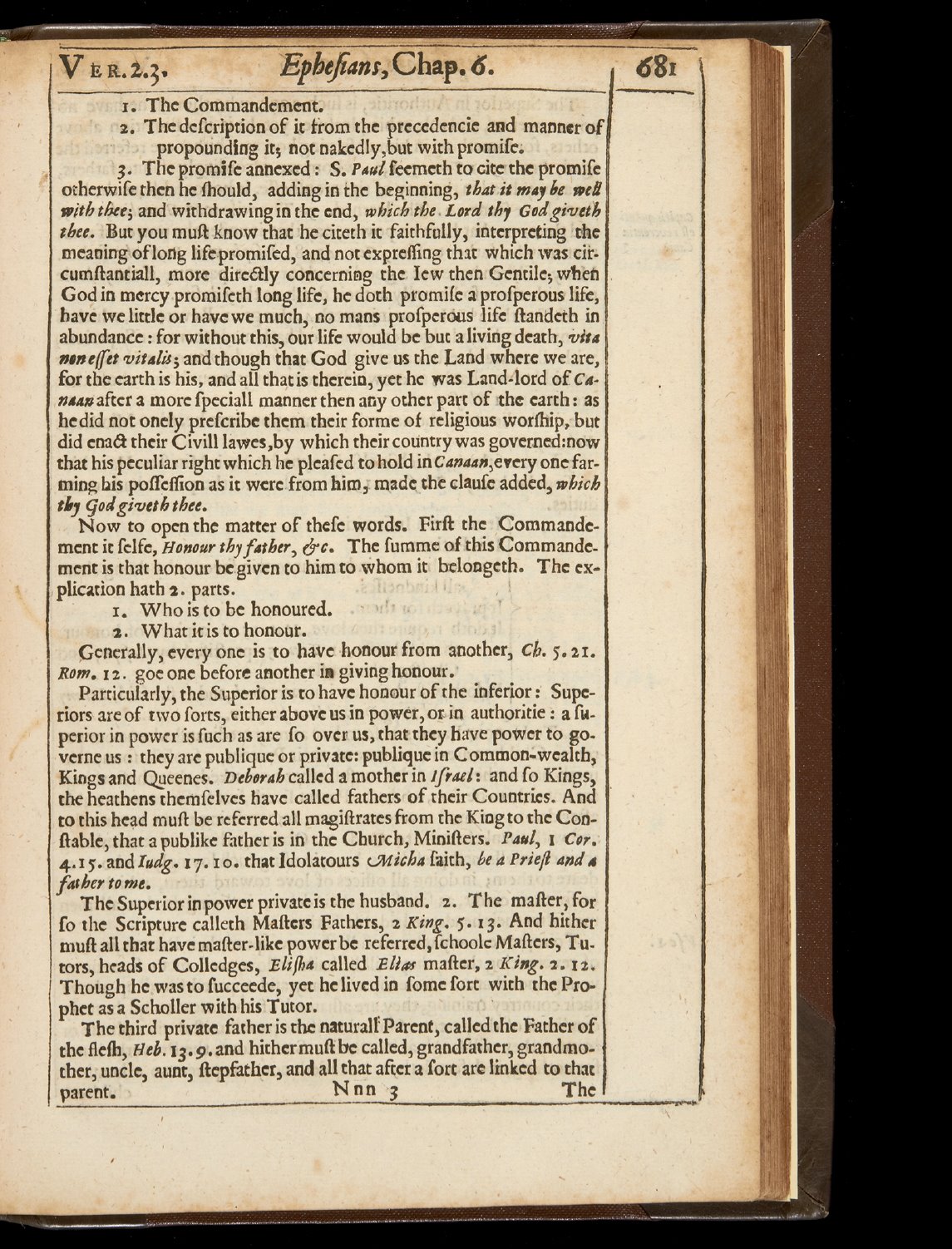

V
t
R.
t.3.
Ephefianr,
Chap.
d.
681
T.
The
Commandement.
z. The
defcription
of
it from
the
precedencie and manner
of
propounding it;
not
nakedly,but with promife.
3.
The
promife annexed
:
S. Paul fecmeth
to
cite
the
promife
ocherwife
then
he fhould, adding in
the
beginning, that
it
may
be
Well
with
thee;
and
withdrawing
in
the end,
which the.
Lord
thy
God
giveth
thee.
But
you muftknow that
he citeth
it
faithfully, interpreting
the
meaning
oflong
lifepromifed,
and
not
expreffing
that which
was
cir-
cumftanttall, more direétly concerning the Iew then Gentile;
wbett'.
God
in
mercy promifeth long life, he
doth
promife a profperous
life,
have welittle
or
havewe much, no mans profperous
life
ftandeth
in
abundance
:
for withoutthis,
our
life
would be but
a living
death,
vita
?unlit
vitalist
and
though that God
give
us
the Land where we are,
for the earth
is
his, and all
that
is
therein, yet
he
was Land-lord
of
Ca-
naanafter
a
more
fpeciall manner
then
any
other
pare
of the
earth:
as
hedid not
onely prefcribe
them
their forme
of
religious worfhip, but
did enaQ
their
Civil'
lawes,by which their
country was governed:now
that
his peculiar
rightwhich
he
pleated
to
hold
inCanaan,every
one
far-
ming
his poffeffion as
it were from
him,
made the
claufe
added,
which
thy
godgiveth
thee.
Now
to
open
the
matter
of
thefe
words. Firft the Commande-
ment it
felfe,
Honour thy
father,
be.
The
fumme
of
this Commande-
ment
is
that honour be
given to him
to whom
it
belongeth.
The
ex-
plication hath
2.
parts.
a.
Who
is
to
be honoured.
2.
What
it
is
to
honour.
Generally, every one
is
to
have honour from another,
Ch.
5.
21.
Rom. t
z. goe one
before another
in
giving
honour.
Particularly, the
Superior
is
to
have honour
of
the
inferior
:
Supe-
riors are
of
two
forts, either
above
us
in
power,
or
in
authoritie
:
a
fu-
perior
in
power
is
fuch
as
are fo over us,
that
they have power
to
go.
verne
us
:
they are publique
or
private: publique
in
Common
-
wealth,
Kings and
Queens.
Deborah
called a
mother
in
ifrael:
and
fo
Kings,
the heathens themfelves
have called
fathers
of
their Countries. And
to
this head muft be referred
all
magiftrates
from the
King
to theCon-
¡table,
that
a
publike
father
is
in
the
Church,
Minifters. Paul,
I
Cor.
4.55.
and Iudg. 57.
r
o.
that Idolatours
c
eticha
faith,
be
a
Priefl
and a
father
tome.
The
Superior
in
power private
is
the
husband. a.
The
malter, for
fo
the
Scripture calleth Matters
Fathers,
a
King.
5. 13.
And hither
mull
all
that
have matter -like
power be referred,
fchoolc
Mailers, Tu-
tors,
heads
of
Colledges,
EliJha
called
Elias matter,
z
King.
z. sa.
Though
he was
to
fucceede,
yet
he lived
in
fome fort with the Pro-
phet
as
a
Scholler with
his
Tutor.
The
third
private father
is
the
naturali'
Parent,
called
the Father
of
the
flefh, Heb.13.
g.
and
hither
muft
be
called, grandfather, grandmo-
ther,
uncle,
aunt, ftepfather,
and all
that
after a
fort
are linked
to
that
parent.
N
n
n
3
The

















